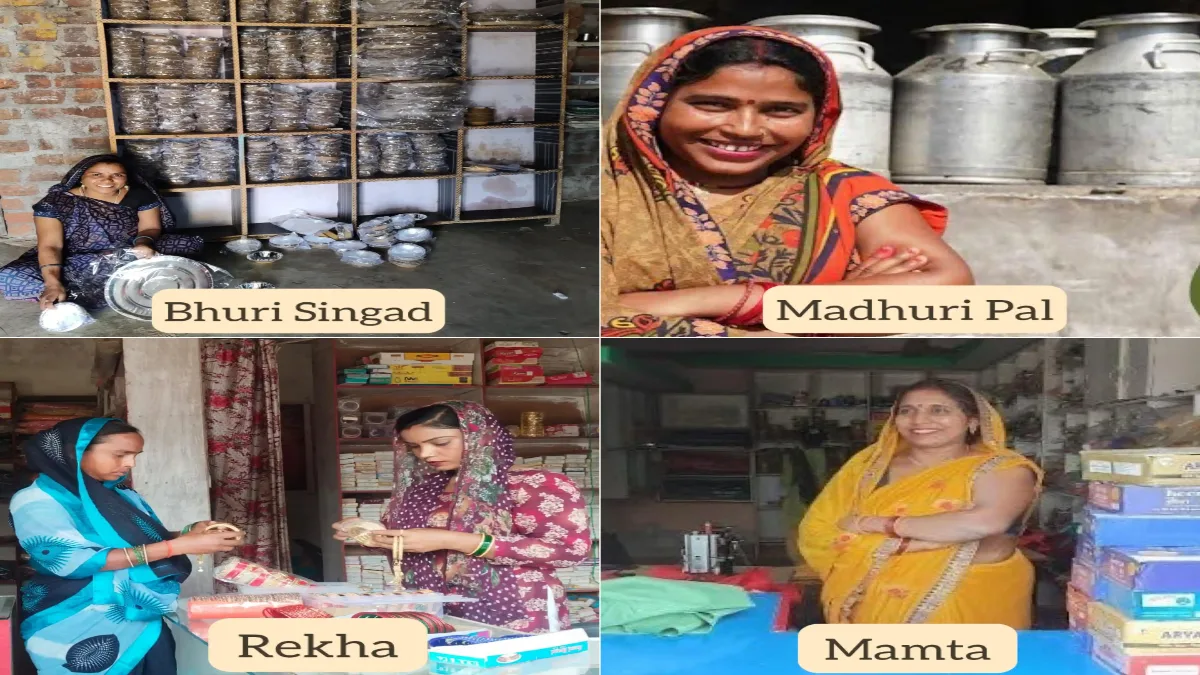
During Global Entrepreneurship Week, these rural achievers exemplify how a rooted support system can nurture microenterprises
A World Bank report published this year, advised India to assign a specific priority sector tag to women-led rural enterprises. The report says it will facilitate easier access to credit, accelerate the growth of women-owned enterprises and encourage female labor force participation (FLFP). During Global Entrepreneurship Week (November 18-24), here are a few uplifting stories of rural women that show how a rooted support system can nurture microenterprises successfully.
Rekha from Belrayan, Uttar Pradesh:
Rekha’s life changed when she joined a women’s SHG (self-help group) helmed by Transform Rural India (TRI), solution designers for regenerative development. “My husband did nothing and when my eldest child reached school-going age, we were in no position to feed the kids, leave alone send them to school. I rebelled for the children’s sake and joined the SHG. I was eventually made the treasurer and also a ‘Samuh Sakhi’.” With financial assistance through the Rang De Groundbreaker Entrepreneur program, she acquired a loan of Rs 40,000. With the help of her SHG, she established a makeshift kiosk where her husband started a readymade garment shop. She went on to rent two shops from a village landlord and paid a deposit of Rs 50,000 for each shop with the help of a CLF (Cluster-Level Federation).
Having taught herself beauty-related work from YouTube videos, she opened a beauty parlour and then a cosmetic shop. With more loans and savings, she also opened a general store which now fetches her nearly Rs 15,000 every month. Today she is a proud employer and has also completed her education. Her three children attend a private school and as she says, ” My life has turned ‘hero’ from zero”. As one of the Board Directors of the TRI-supported Women Farmer Producer Company (WFPC), she also fosters collaboration among women farmers,
Madhuri Pal from Lakhimpur Kheri, Uttar Pradesh:
The story of Madhuri Pal, the proud owner of a milk collection centre, demonstrates her grit to succeed against diverse odds. She says, “I started my milk collection centre in 2019 with just 5 litres of milk per day but today, the centre gathers at least 2.5 quintals a day.”
Despite conspiracies by insecure local milkmen. Madhuri established her collection centre with the help of a TRI-driven self-help group. She initially faced a setback when some conspirators laced a batch or two of milk with a coagulator. She recalls, “It led to the entire collection getting spoiled. But I was determined to succeed. I also realised that I must pay the farmers without delay. I sold some of my buffaloes and took loans with the help of the SHG and CLF (cluster-level federation). This created a regular cycle of payments and my business clicked.”
The Rang De Groundbreaker Entrepreneur program provided her with financial support through TRI to further expand her enterprise. Now Madhuri also supplies khoya (solid condensed milk) and paneer (cottage cheese) and aspires to set up an ice cream-making unit. Her husband, a farmer, was once the only earning member of the family but Madhuri’s success has now enabled her three children to go to a good school. She also serves as a Board Director of the Women Farmer Producer Company (WFPC) and manages WFPC’s accounts, ensuring its financial stability and growth.
Mamta from Gulaura, Uttar Pradesh:
Mamta’s journey towards self-dependence began when she joined a SHG, became its president and started to mobilize resources to start a tailoring unit. Recognising her potential, development designers TRI provided her with training in financial literacy, stitching as well as bookkeeping and stock procurement. Securing a loan of Rs. 50,000, she started her unit with just two sewing machines. Slowly the center expanded and has to date taught tailoring to around 40 to 50 girls.
Mamta charges Rs. 250/- per month from each student who then goes on to earn around Rs. 1000/- to Rs. 1250/- per month. She has also ventured into retail by opening a small clothing store and earns Rs. 7000 to Rs. 8000 per month. Exemplifying the transformative power of entrepreneurship, she is now a source of inspiration for rural women.
Bhuri Singad from Gunawad, Madhya Pradesh:
Bhuri Singad was born into an impoverished family in Petlawad and she and her husband Raju Singad were migrant farm labourers. A chance meeting with Anita Didi from Nari Adhikar Kendra (NAK) familiarised her with TRI’s initiative to empower underserved women like her. Eager to start a business, she registered for a psychometric test and counselling. Once she learnt about business opportunities and various ways to access financial help, there was no looking back.
She says, “My husband and I then decided to start a Dona Pattal Unit as there was no such enterprise in our village. We contacted the Nari Adhikar Kendra coordinator for help in preparing a business plan and to seek financial assistance.” The NAK team also organized an exposure visit for her to a Dona-pattal-making unit.
With their help, she was able to get a loan of Rs 70,000 rupee from Sampark Financial Services (please confirm) along with requisite technical support. “The monthly income of over Rs 10,000 has made me financially independent and I am also helping my family to attain a good living standard,” she says, adding that she no longer has to work as a migrant farm labourer. Her children are now studying at Indore and she is also repaying the loan amount. She hopes to expand her business with the help of a bigger loan shortly.

